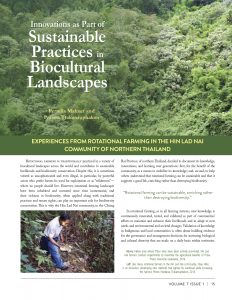 Story highlights
Story highlights
- A recent article presents how the rotational farming system in Hin Lad Nai, Northern Thailand, integrates innovations and traditional knowledge
- The knowledge mobilised and documented by the community is validated within the unique context of local institutions
- An enhanced knowledge base can better inform equitable and legitimate policy and decision-making processes
Rotational farming practices have been part of the livelihood of the Karen people in Northern Thailand for time immemorial. Those landscapes are rich in biodiversity, and have been wisely managed by their inhabitants, which continuously introduce rotational farming innovations as part of a refinement process in their traditional knowledge and practices.
One such innovation was the intensified utilization of a native tree named P’dav (Macaranga denticulata) in fallow fields which, among other benefits, helps to restore soil fertility, reduces the presence of weeds, and retains water, while also creating a suitable habitat for other species.
We have to take up the challenge to present the evidence we have regarding how our Indigenous and local knowledge is contributing to biodiversity conservation and sustainable use, to outsiders who think that rotational farming systems are destroying the environment and forest. Prasert Trakansuphakonof
The community of Hin Lad Nai decided to start documenting those practices and to pilot the multiple evidence-based approach in which Indigenous, local, and western scientific knowledge systems are seen as equally valid, legitimate, and useful each on their own term. SwedBio in collaboration with partners is engaged in the development and piloting of this approach, the aim being to mobilise knowledge, generate mutual understanding and recognition about the sustainability of indigenous and local knowledge and practices, and find synergies and new solutions for enhanced biodiversity governance across knowledge systems.
A multiple evidence-based approach emphasizes the value of letting each knowledge system speak for itself, within its own context, and the validation of knowledge occurs within, rather than across, knowledge systems. […] in Indigenous and local knowledge systems, knowledge may be tested and evaluated through everyday practice or approved by an elder or other experts, such as a shaman, representing the recognized institutions having expertise within that knowledge system. Bringing knowledge together, mobilized from a diversity of knowledge systems, on their own terms, creates an enriched picture with different perspectives. Pernilla Malmer
The evidence gathered within this framework can inform policy and decision-making, contributing valuable perspectives and solutions, generated endogenously within local communities.
The article is authored by Pernilla Malmer, SwedBio, and Prasert Trakansuphakon, Pgakenyaw Association for Sustainable Development and Inter Mountain Peoples Education and Culture in Thailand Association, and is made available by courtesy of Terralingua.

 LANGSCAPE MAGAZINE ARTICLE Innovations as Part of Sustainable Practices in Biocultural Landscapes
LANGSCAPE MAGAZINE ARTICLE Innovations as Part of Sustainable Practices in Biocultural Landscapes Pernilla Malmer
Pernilla Malmer